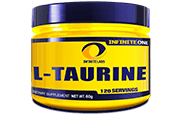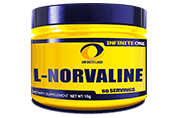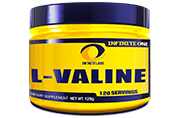

L-TAURINE
Table of Contents
ABOUT:
L-TAURINE MAY HELP TO:
- SUPPORT CARDIOVASCULAR HEALTH*
- SUPPORT ENERGY LEVELS*
- ASSIST IN MAINTAINING MUSCLE*
| Taurine is an amino acid. Natural sources of taurine include protein-rich food sources, such as meat and fish. Taurine regulates your blood’s water level and mineral level. It may also function as an antioxidant. L-Taurine plays a significant role in the function of the adrenal, pituitary and thyroid glands. Multiple studies have confirmed that Taurine can reduce exercise-induced oxidative stress potentially enhancing exercise performance. Taurine also helps to regulate your neurotransmitters and can affect growth and development, muscle contraction as well as physical performance. Therefore, a greater amount of taurine is found in your brain, liver, muscles and heart. |
Taurine is an essential structural constituent of the bile, which is needed to breakdown dietary fats. You may see taurine listed as an ingredient in sports beverages and energy drinks. These products often claim to boost your energy level, but some believe it’s possible that taurine could have an effect on your weight, too. Taurine is an amino acid that is necessary for normal skeletal muscle functioning and is popularly promoted for weight loss. In one of the most interesting discussions on taurine comes from Dr. Pasquale’s book. In his overview over the effect of taurine on health and exercise performance Mauro Di Pasquale (Di Pasquale, M.G.: Amino Acids and Proteins for the Athlete. 2008. p. 312) writes: “Taurine has also been shown to increase glucose sensitivity and enhance mitochondrial metabolic function. The data in this study suggest that taurine administration has a marked effect on lipid metabolism, and can, therefore, be beneficial to persons looking to lose body fat. Also, that restoration of plasma taurine level could be critical in preventing or improving obesity-related cell dysfunction. A recent study found that taurine supplementation may be an effective treatment for glucose intolerance and fat=lipid accumulation observed in type 2 diabetes associated with obesity. Taurine has been shown to be an important amino acid in several tissues in the body, including muscle.” Another interesting finding is the fact that taurine can enhance fat mobilization and possibly fat loss.
One study has shown a favorable increase of fat oxidation during exercise with taurine ingestion. A 2009 study found that in rats supplemented with taurine had increased “time to exhaustion” during exercise. A 2010 study published in the International Journal of Sports Nutrition and Exercise Metabolism reveals taurine supplementation increased fat oxidation during exercise. Researchers examined whether acute taurine ingestion before prolonged cycling would improve time-trial performance and alter whole-body fuel utilization compared with a control trial and a placebo trial in which participants were told they received taurine but did not.
Eleven endurance-trained male cyclists completed 3 trials in a randomized, crossover, blinded design in which they consumed a noncaloric sweetened beverage with either 1.66 g of taurine or nothing added 1 hour before exercise. Participants then cycled at 66.5 % of their VO2max for 90 min followed immediately by a time trial. At the end of the study, there was no difference in time trail performance between any of the 3 trials. One interesting finding was that Taurine ingestion resulted in a 16% increase in total fat oxidation over the 90-min exercise period compared with control and placebo trial.
In a new 2015 study published in Amino Acids, researchers found that taurine may be able to reduce appetite as well. Researchers placed mice on protein-restricted high-fat diet and taurine supplementation. At the end of the study, taurine was able to prevent fat gain, only if there was enough protein in the diet, which re-inforces the use of high protein diet when trying to lose fat. Another interesting finding was that it’s well established that high-fat diets induce leptin resistance (leptin is the hormone which control appetite, high-fat diets disrupt leptin signaling). Taurine supplementation was able to counteract the adverse effects of the high-fat diet and help prevent leptin resistance. Taurine enhances metabolic activity on the cellular level and enables an individual to burn more fat. It can also prevent loss of muscle mass during bouts of quick weight loss. Since taurine boosts the body’s sensitivity to insulin and improves protein synthesis, it helps in muscle building.
Taurine Increases Muscle Mass
In the body, taurine is synthesized from the essential amino acid methionine and its related non-essential amino acid cysteine. Taurine is found naturally in meat, fish and breast milk, and it’s commonly available as a dietary supplement. Because of taurine’s essential role in the body, supplementing with taurine can provide numerous health benefits, including restoring insulin sensitivity, mitigating diabetic complications, reversing cardiovascular disease factors, preventing and treating fatty liver disease, and more. Taurine has many biological roles in the body, it has antioxidant and is essential for the body because of its part in the maintenance of organ and cell function. One theory is that taurine, together with glutathione, helps protect the cells against harmful compounds that are released when energy is generated. Taurine is essential for cardiovascular function, and development and function of skeletal muscle, and the central nervous system. A study published in November 2012 made the bold statement that taurine is one of the most essential substances in the body. The authors wrote: “Considering its broad distribution, its many cytoprotective attributes, and its functional significance in cell development, nutrition, and survival, taurine is undoubtedly one of the most essential substances in the body.”
Taurine has also been found to enhance muscle recuperation as well. In particular, it was reported that taurine has a cell protective effect against free radical-mediated skeletal muscle injury induced by downhill running in rats. The authors also confirmed that oral taurine administration in rats reduces exercise- and drug-induced oxidative stress. Previous studies have evaluated the effectiveness of branched-chain amino acid (BCAA) supplementation for preventing delayed onset muscle soreness (DOMS) and muscle damage induced by eccentric exercise. Since taurine has anti-inflammatory and anti-oxidative effects, researchers investigated the combined effect of BCAA and taurine on delayed onset muscle soreness and muscle damage.
Thirty-six untrained male subjects were assigned to four groups (placebo, BCAA + placebo, placebo + taurine, and BCAA + taurine
Jeukendrup AE, Randell R. Fat burners: nutrition supplements that increase fat metabolism. Obes Rev. 2011 Oct;12(10):841-51.
Rutherford JA, Spriet LL, Stellingwerff T. The effect of acute taurine ingestion on endurance performance and metabolism in well-trained cyclists. Int J Sport Nutr Exerc Metab. 2010 Aug;20(4):322-9.
Yatabe Y, Miyakawa S, Ohmori H, Mishima H, Adachi T. Effects of taurine administration on exercise. Adv Exp Med Biol. 2009;643:245-52.
Zhang M, Bi LF, Fang JH, Su XL, Da GL, Kuwamori T, Kagamimori S. Beneficial effects of taurine on serum lipids in overweight or obese non-diabetic subjects. Amino Acids. 2004 Jun;26(3):267-71.
Camargo RL, Batista TM, Ribeiro RA, Branco RC, Da Silva PM, Izumi C, Araujo TR, Greene LJ, Boschero AC, Carneiro EM. Taurine supplementation preserves hypothalamic leptin action in normal and protein-restricted mice fed on a high-fat diet. Amino Acids. 2015 Jul 2.
Chapman, R.A., Suleinan, M.S. & Earm, Y.E. (1993) Taurine and the heart, Cardiovascular Research, Volume 27, issue 3, (pp. 358-363).
Ripps H, Shen W. Review: Taurine: A “very essential” amino acid. Mol Vis. 2012;18:2673-86. Epub Nov 12, 2012.
Yang J, Wu G, Feng Y, Lv Q, Lin S, Hu J. Effects of taurine on male reproduction in rats of different ages. Journal of Biomedical Science. 2010;17(Suppl 1):S9.
Dawson R Jr, Biasetti M, Messina S, Dominy J: The cytoprotective role of taurine in exercise-induced muscle injury. Amino Acids 2002, 22:309-324.
Silva LA, Silveira PC, Ronsani MM, Souza PS, Scheffer D, Vieira LC, Benetti M, De Souza CT, Pinho RA: Taurine supplementation decreases oxidative stress in skeletal muscle after eccentric exercise. Cell Biochem Funct 2011, 29:43-49.
Miyazaki T, Karube M, Matsuzaki Y, Ikegami T, Doy M, Tanaka N, Bouscarel B: Taurine inhibits oxidative damage and prevents fibrosis in carbon tetrachloride-induced hepatic fibrosis. J Hepatol 2005, 43:117-125.
Miyazaki T, Matsuzaki Y, Ikegami T, Miyakawa S, Doy M, Tanaka N, Bouscarel B: Optimal and effective oral dose of taurine to prolong exercise performance in rat. Amino Acids 2004, 27:291-298.

















